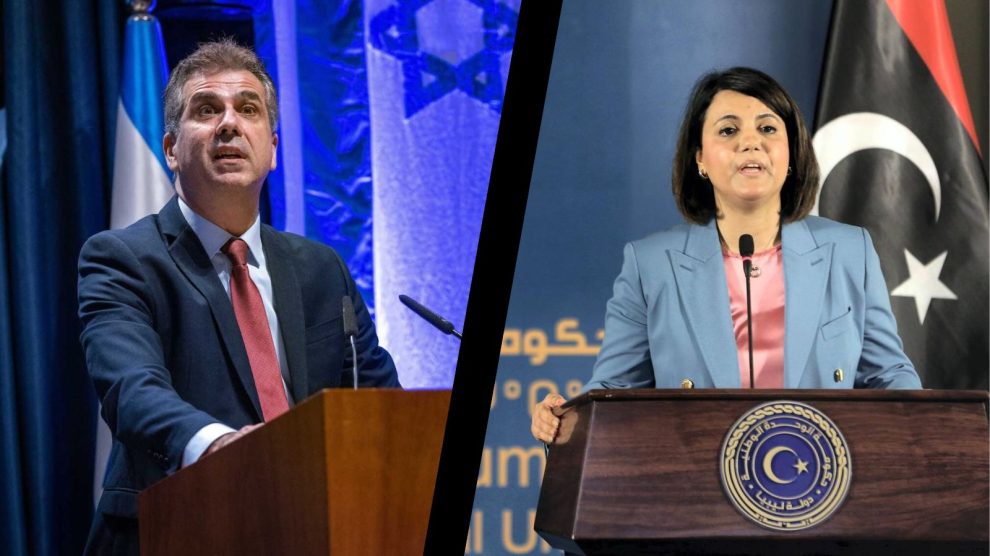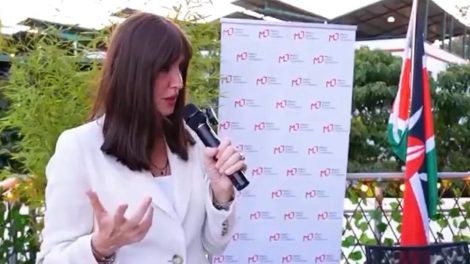Libyan FM suspended in diplomatic row. On Monday, Libya’s Government of National Unity (led by Abdelhamid Dbeibah and backed by the United Nations) suspended Foreign Minister Najla Mangoush and placed her under investigation after media reports that she met with her Israeli counterpart Eli Cohen.
- The matter is politically sensitive, given the history of Israeli-Libyan ties. According to unconfirmed reports, Ms Mangoush has since fled to Turkey. Several people took to the streets in Tripoli and protested under the Foreign Ministry.
What was Italy’s role? The Libyan Foreign Ministry clarified that Ms Mangoush had refused a meeting with representatives of Israel. What had happened was “an unprepared and unofficial meeting during a visit to the Italian Foreign Minister.” According to the Israeli side, the meeting was handled by the Italian Foreign Ministry, but Decode39 understands it did not take place inside its actual offices.
- National Security Adviser Ibrahim Bheibah, nephew of the Libyan PM, also attended the face-to-face meeting, as it was the Libyan government itself that had thought of the opportunity.
- Nevertheless, facing backlash, PM Dbeibah preferred to shift responsibility to FM Mangoush and avoid direct accusations.
Conflicting narratives. The Israelis said that FMs Mangoush and Cohen discussed possible Israeli cooperation and aid in humanitarian issues, agriculture and water management. The latter also said he spoke with his Libyan colleague about the importance of preserving Jewish heritage in Libya as well as “the great potential that [their] relationship can offer the two countries,” according to a statement.
- In contrast, the Libyan ministry stressed in its own statement that the interaction did not include “any discussion, agreement or consultation” and sought to renew “its complete and utter rejection of normalisation” with Israel.
- Libya is among the Arab states that have gone on the record to oppose de-escalating relations with Israel after the latter began its process of normalising relations with some Muslim countries under the so-called “Abraham Accords.”
Tripoli’s entrenched hardline… The Libyan ministry stresses the country’s “firm and decisive” position on Jerusalem being “the capital of Palestine.” It also “categorically condemn[ed] the exploitation by the Jewish and international press and their attempt to give the incident the character of meetings, talks or even organising and simply thinking of holding such meetings,” reiterating its “total and absolute rejection of normalisation with the Zionist entity” (i.e. the State of Israel).
- Some parts of the Arab and Islamic world see the current Israeli executive in an especially negative light, since the governing coalition comprises parties with a radical, aggressive line on the Palestinian issue.
- The fate of the Palestinians and the so-called “two-state solution” are issues that the Arab and Islamic populations still regard as touchy and symbolic. Although the Abraham Accords have enabled geopolitical détente and economic/commercial benefits, they have still failed to touch the socio-cultural plane.
… and the reactions. In this context, Israel’s announcement of the meeting between FMs Mangoush and Cohen sparked adverse popular and political reactions in Libya. Sources close to the Speaker of the House of Representatives, Agila Saleh, moved quickly to invite deputies to attend an emergency session in Benghazi, Cyrenaica, on Monday, August 28. The subject line: discussing “the legal and moral crime against the Libyan people.”
- Mr Saleh and the House withdrew the confidence accorded to PM Dbeibah long ago, though he never resigned.
- The High Council of State, which plays an advisory role in Libyan politics, expressed its “surprise” at the reports and said those responsible “should be held accountable.”
- Mohammed Menfi, leader of the Libyan Presidential Council, called on PM Dbeibah to explain what had happened, writing that the meeting “does not reflect the foreign policy of the Libyan state” and is “a violation of Libyan laws that criminalise normalisation with the Zionist entity.”
A step back. Libyan foreign policy is complicated by years of conflict and bitter internal divisions over control of the government and the legitimacy of any moves made by the administration in Tripoli. The Government of National Unity (GNU) was installed in early 2021 through a UN-backed peace process, but its legitimacy has been questioned since early 2022 by the Cyrenaica-based House of Representatives after a failed attempt to hold elections.
- Previous foreign policy moves on behalf of GNU, including agreements reached with Turkey, have also been rejected by the HoR and are subject to legal challenges.
- Beyond political and public positions, however, normalising ties with Israel may be in Libya’s overall interests – a dossier where Italy may (cautiously) play a leading diplomatic role – as a more pragmatic entente with the Israelis could both lend international legitimacy to PM Dbeibah and profit some domestic components (including Libya’s Jewish diaspora).
- Over the years, there have been several rumours about informal meetings between Libyan officials, both from Tripolitania and Cyrenaica, and Israelis.
The expert’s take. Arturo Varvelli, director of the European Council on Foreign Relations’ Rome office, told Decode39 that Tripoli suspending its foreign minister is “very specious.” Minister Mangoush has long not enjoyed sympathies in the country, he said, as she has always been seen as a foreign body in the government: “a woman in a world where equal rights is far from a reality, she has lived abroad, she behaves in ways that have long seen her as undesirable.”
- Therefore, perhaps someone is looking for an opportunity to blow her off, especially given that her post is “coveted”. Mr Varvelli believes that the Israeli issue “has been used by those protesting as a pretext, as is often the case.”
- “We are facing a potential government reshuffle, sponsored by those who see this solution as a vector for stabilisation and elections. A new government is being considered, although it is very delicate to change the balances that hold the current Libyan (in)stability, and there are risks of uncontrolled drifts.”
- It cannot be ruled out that some levers have been activated in Tripoli with this scenario in mind under the guise of a highly appealing issue – Israel-Palestine.





